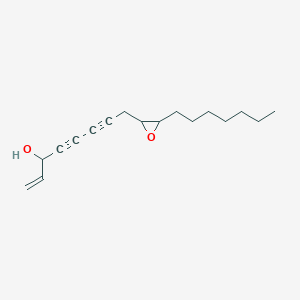Ferroptosis-centered Drug Response Information
General Information of the Drug (ID: ferrodrug0282)
| Name |
Panaxydol
|
||||
|---|---|---|---|---|---|
| Synonyms |
Panaxydol; (-)-Panaxydol; 114718-63-7; 8-(3-heptyloxiran-2-yl)oct-1-en-4,6-diyn-3-ol; 9,10-epoxy-heptadeca-1-en-4,6-diyn-3-ol; 9,10-epoxy-1-heptadecen-4,6-diyn-3-ol; SCHEMBL2266131; DTXSID10415267; GVLDSGIQZAFIAN-UHFFFAOYSA-N; LMFA05000028; 9,10-Epoxy-1-heptadecene-4,6-diyn-3-ol; 8-(3-Heptyloxiranyl)-1-Octene-4,6-diyn-3-ol; 8-(3-Heptyloxiranyl)-1-octene-4,6-diyn-3-ol, 9CI; (3R,9R,10S)-9,10-Epoxy-1-heptadecene-4,6-diyn-3-ol; (R)-8-((2R,3S)-3-Heptyloxiran-2-yl)octa-1-en-4,6-diyn-3-ol; 1-Octene-4,6-diyn-3-ol, 8-[(2R,3S)-3-heptyl-2-oxiranyl]-, (3R)-; 1-Octene-4,6-diyn-3-ol, 8-[(2R,3S)-3-heptyloxiranyl]-, (3R)-; 1-Octene-4,6-diyn-3-ol, 8-(3-heptyloxiranyl)-, [2R-[2.alpha.(R*),3.alpha.]]-
Click to Show/Hide
|
||||
| Structure |
 |
||||
| Formula |
C17H24O2
|
||||
| IUPAC Name |
8-(3-heptyloxiran-2-yl)oct-1-en-4,6-diyn-3-ol
|
||||
| Canonical SMILES |
CCCCCCCC1C(O1)CC#CC#CC(C=C)O
|
||||
| InChI |
InChI=1S/C17H24O2/c1-3-5-6-7-10-13-16-17(19-16)14-11-8-9-12-15(18)4-2/h4,15-18H,2-3,5-7,10,13-14H2,1H3
|
||||
| InChIKey |
GVLDSGIQZAFIAN-UHFFFAOYSA-N
|
||||
| PubChem CID | |||||
Full List of Ferroptosis Target Related to This Drug
Nuclear factor erythroid 2-related factor 2 (NFE2L2)
| In total 1 item(s) under this Target | |||||
| Experiment 1 Reporting the Ferroptosis-centered Drug Act on This Target | [1] | ||||
| Target for Ferroptosis | Marker/Suppressor | ||||
| Responsed Disease | Lung injury | ICD-11: NB32 | |||
| Responsed Regulator | Kelch-like ECH-associated protein 1 (KEAP1) | Driver | |||
| Pathway Response | Fatty acid metabolism | hsa01212 | |||
| Ferroptosis | hsa04216 | ||||
| Pathways in cancer | hsa05200 | ||||
| Cell Process | Cell ferroptosis | ||||
| In Vitro Model | BEAS-2B cells | Normal | Homo sapiens | CVCL_0168 | |
| In Vivo Model |
Specific pathogen-free (SPF) male C57BL/6 mice (6-8 weeks old, 20-24 g body weight) were purchased from the Experimental Animal Center, Anhui Medical University (Hefei, China). All mice were randomly divided into five groups (8 mice every group): control group, LPS group, PX+LPS group (administered 20 mg/kg PX), Fe+LPS group (administered 15 mg/kg Fe-citrate (III)), and PX+Fe+LPS group (administered 20 mg/kg PX and 15 mg/kg Fe-citrate (III)). Fe-citrate (III) was dissolved in stroke-physiological saline solution (SPSS). PX was dissolved in dimethyl sulfoxide (DMSO; Sigma-Aldrich), and further diluted in SPSS. Intravenous injection of Fe or/and intraperitoneal injection of PX were performed from day 0 to day 2. At 1 h after the final Fe and PX treatment, the mice were anesthetized with 30 mg/kg of pentobarbital sodium (Beijing Chemical Co., China) and then LPS (10 ug/mouse; InvivoGen, San Diego, CA, USA) or SPSS was injected into the trachea.
Click to Show/Hide
|
||||
| Response regulation | Ferroptosis mediated inflammation in LPS-treated BEAS-2B cells, and panaxydol (PX) might ameliorate LPS-induced inflammation via inhibiting ferroptosis. PX attenuates ferroptosis against LPS-induced acute lung injury via Keap1-Nrf2/HO-1 pathway, and is a promising novel therapeutic candidate for acute lung injury. | ||||
